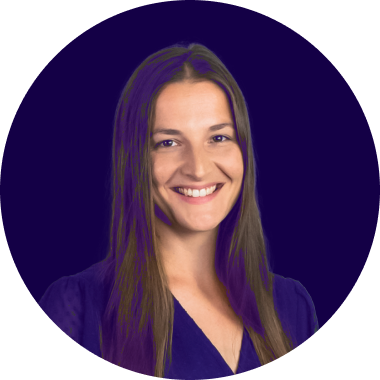The data industry needs you! More than 120 women applied to this call for the "Women in Data" scholarship. 50 of them received one of the coveted scholarship spots for the Data Analyst advanced training at StackFuel. And unfortunately, it's true: the data industry is still predominantly male. Just one-sixth of data experts are female, with a negative impact on business, development and research. The Corona Crisis has been particularly detrimental to women's career advancement. This is exactly where the StackFuel and Telefónica scholarship should have a positive impact and qualify women for data professions and make them fit for the future with data skills.
Monika is one of 50 winners. Her new data analyst skills will be put to use primarily in her current job, as Monika works for the Center for International Peace Operations in Berlin. As a political scientist, she says, she is anything but a "techie," but it was out of a desire to always develop herself that she applied for the scholarship. In the interview, Monika talks about her real goal after the data analyst training and why she thinks data skills should be promoted more.
Hi Monika, first of all congratulations on winning the scholarship. What should our readers know about you?
Hello, thank you very much. I come from Landshut, a city with about 75,000 inhabitants northeast of Munich. I was born and raised here, but then left the city pretty quickly after graduating from high school to go to Munich to study.
What course did your career take from that point on?
I initially studied communications for a year, but after a short time I realized that it was too theoretical for me and applied for a traineeship. I spent two years at a daily newspaper, worked as an editor and only later resumed my studies. While studying political science and international law, I completed various internships and took on assistant jobs. After graduation, I first worked on various projects, then spent two years in development cooperation at the Deutsche Gesellschaft für Internationale Zusammenarbeit in Frankfurt, and when ZIF, the Center for International Peace Operations and my current employer, was founded in 2002, I went to Berlin and was one of its first employees.
Today, I am a research associate at ZIF, a subsidiary organization of the German Foreign Office that was founded to strengthen international capacities for crisis prevention, conflict resolution and peacebuilding. Among other things, we train civilian personnel primarily for peace operations of the United Nations, the OSCE, and the European Union. We recruit personnel and also supervise them during their deployment. We also provide analysis, information and policy advice on peace operations. It is in this last area that I work. One of our current focuses is on peace operations and new digital technologies. In this regard, we are currently investigating how digital technologies can support peace operations in implementing their diverse mandates.
I have two children, 15 and 17 years old. It was always important to me that I stay in my job despite the children. That's what I did from the start, initially part-time on a 20-percent basis, but later I increased my hours. That was a very good way for me, at least I'm back on the job full time today. I'm always interested in new topics, which I really enjoy getting involved in.
The years 2020 and 2021 have brought many unpredictable changes. How did you experience this time?
In addition to the changes in our private lives that we have all experienced, some of the changes for me personally in my job have actually been positive. Our organization managed to digitize very quickly and we were all well equipped in the home office. What I found particularly great was the opportunity to bring the world home. I attended a lot of international conferences during that time that I might not have otherwise gotten to or taken the opportunity to attend. I experienced it as a great opportunity to broaden my horizons and to do so without much effort, from my own desk.
So you could say that you have always recognized and taken advantage of your professional opportunities. Have you also encountered hurdles in the process so far?
I have to admit that I have been very lucky not to encounter too many hurdles. I have always worked in very good environments and in teams that are interested in joint success. But there was still one hurdle for me, even if it was more of a content-related nature: the topic of technology. I am a political scientist and am currently working on how to use digital technologies in peace operations. Unfortunately, I'm not a "techie," so this whole field was absolutely new to me, and it was challenging to familiarize myself with it. That's when I was initially dealing with questions like, "What is artificial intelligence?" "What is machine learning?" But as is often the case, a topic becomes more exciting the deeper you go into it. And so this hurdle is also getting smaller and smaller.
These topics are also reflected in the "Data Analyst" training program, for which you received a scholarship. How did you hear about the "Women in Data" scholarship?
By chance. I subscribed to a newsletter from Women in Tech e.V. and read about the scholarship there. Shortly before, I had a personnel development meeting in which we had talked about the topic of data analysis, so I thought I'd give it a try. When I looked at the website, I was finally convinced because the training seemed very well structured and really fit my current needs. I hope to gain a better understanding of the possible applications of data analysis. In my view, this is an important competence if you want to use data more intensively in an organization. My goal would be to run a data analytics project myself with a team, but only time will tell. I'm looking forward to putting the new knowledge to practical use on my own afterwards.

Where did your interest in working with data come from, and how do you feel about the fact that you will soon be involved with math and programming?
Data is currently a very important topic for the United Nations. The UN Secretary-General recently published his first Data Strategy, and the topic is now also very present in peace operations. Among other things, this involves optimizing conflict analyses or recording hate speech in social media. The topic of data is omnipresent. I'm interested in the possibilities that data analysis offers. Nowadays, it is simply important to deal with data in order not to lose touch. I'm not afraid of data and the learning content, but I do have respect. I fundamentally believe that you can get into anything if you just want to. All it takes is time and a certain passion. There may be limits for a social scientist, though, but we'll see. For now, I'm optimistic.
Finally, is there anything you would like to share with other women that will help them on their journey?
Probably true for everyone; you are always good at what you have a certain passion for. STEM subjects have always been rather male-dominated, even though boys/men are certainly not naturally superior to girls/women in technical fields. That's why I would say just do it! There's no reason to hesitate. Just try it out.
Your entry as Data Analyst:in
We strongly believe that all women should have the same opportunities to pursue a career as a Data Analyst. Whether you think you're at a disadvantage or not, whether you're already working in a data-related environment or starting your career as a career changer - with us, you'll get the chance to hone your data skills and shape your career path.
At this time, no new edition of the scholarship has been announced, but on our social media accounts on LinkedIn, Instagram, Facebook and Xing you'll be the first to know about new events, scholarships and other great promotions and content.






